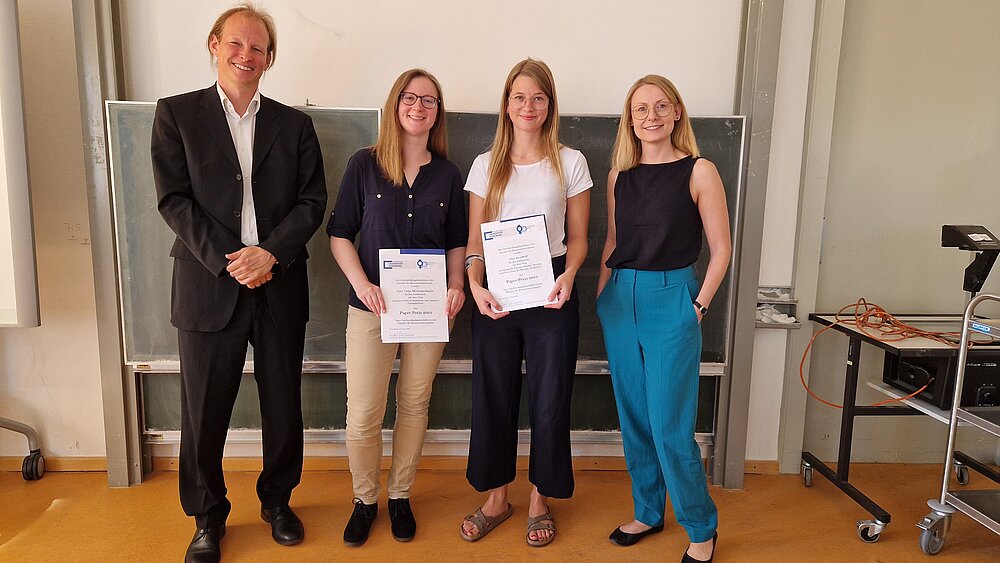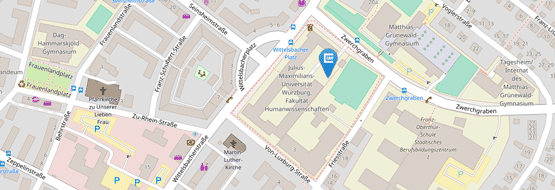Best Paper Award
The Gender Equality Commission of the Faculty of Human Sciences gives two awards for female junior researchers of this Faculty. The wide range of academic disciplines within the Faculty will be taken into account in the selection process.
The award is designed to advance the careers of female junior researchers as well as female doctoral and Habilitation candidates at the Faculty of Human Sciences.
The cash prize of €1,000 may be used for research activities.
Nominations will be evaluated according to originality and scientific contribution to the respective field of study.
Call for applications for the Best Paper Award presented by the Gender Equality Commission of the Faculty of Human Sciences
The Gender Equality Commission of the Faculty of Human Sciences will give two Best Paper Awards for female junior researchers at this Faculty. Each award comes with a cash prize of €1,000. The wide range of academic disciplines within the Faculty will be taken into account in the selection process. For the fifth year the Best Paper Award 2024 is designed to advance the careers of female junior researchers as well as female doctoral and Habilitation candidates at the Faculty of Human Sciences.
Scientifically relevant publications as first author of the respective discipline (e.g., journal article, chapter in an edited volume) may be submitted. Selection for the award will be based on the originality of the paper and its impact on the discipline in question as well as on diversity and excellence of research at the Faculty of Human Sciences, i.e. impact factor alone is not decisive. To be eligible for the award papers must have been published in 2023 or later. Papers that have been accepted for publication are also eligible.
The selection process by the Faculty’s Gender Equality Commission will take place in the summer semester 2024 and will strive to take into account the research and publication culture in all scientific disciplines at this Faculty. Awardees will be notified as soon as their selection for the award has received approval from the Dean. The prize money may be spent on research activities according to the funding guidelines of the University of Würzburg (conference attendance, research subject fees, student tutors etc.).
Application requirements:
- The nominated paper
- Abstract (1 page max.)
- Information about the paper (2 pages max.) stating
- relevance of the journal or edited volume (e.g., peer review, impact factor),
- which contribution the applicant has made in the case of two or more authors:
- how the paper impacts and advances the applicant’s field of research,
- the paper’s impact beyond the discipline in question,
- allocate the paper to its scientific study category (e.g., quantitative research, qualitative research, literature reviews, hermeneutic approach).
- Intended use of the prize money
- Proof that the applicant’s employment contract with the University of Würzburg will end no earlier than the expenditure of the prize money
Please email your complete application as a single file PDF document to gleichstellung.hw@uni-wuerzburg.de. The closing date for applications is 18 March 2024.
Sincerely,
Prof. Dr. Carina Lüke
(Women’s Representative of the Faculty of Human Sciences) on behalf of the Faculty’s Gender Equality Commission
Tanja Messingschlager
Tanja Messingschlager (Institute for Human-Computer-Media: Psychology of Communication and New Media) received the Best Paper Award for her first-author paper titled ‘Creative Artificial Intelligence and Narrative Transportation’. The publication by Tanja Messingschlager as first author of a research group relates how the manipulation of information about the authorship, that is, AI vs. human authors, influences reception. Whereas human authorship was shown to be preferred in the case of contemporary fiction, transportation did not differ between human and AI authorship when participants read science fiction.
Sara Wolf
Sara Wolf (Institute for Human-Computer-Media: Psychological Ergonomics) received the Best Paper Award for her paper titled ‘Designing for Uncontrollability: Drawing Inspiration from the Blessing Companion’. The paper presents an inspirational concept for companion technology design, uncontrollability, and a corresponding artefact, the Blessing Companion.
The young scientist and her team adopted the concept of uncontrollability, explored how it might be implemented in companion technologies, and designed the Blessing Companion. The Blessing Companion embodies uncontrollability through its ambiguous appearance and (partly) uncontrollable behavior.
| Year | Awardee | ||
|---|---|---|---|
| 2023 | Tanja Messingschlager (Psychology of Communication and New Media) | ||
| Sara Wolf (Psychological Ergonomics) | |||
| 2022 | Dr. Catharina Tibken (Psychology) | ||
| Dr. Sonja Schierbaum (Philosophy) | |||
| 2021 | Lea Goldan (Quantitative Methods of Empirical Social Research) | ||
| Dr. Ann-Kristin Herget (Media and Business Communication) | |||
| 2017 | Anja Kürzinger (School Pedagogy/Primary Education) | ||
| Dr. Kristina Suchotzki (Psychology) | |||
| Jennifer Tiede (School Pedagogy) | |||
| Year | Awardee |






